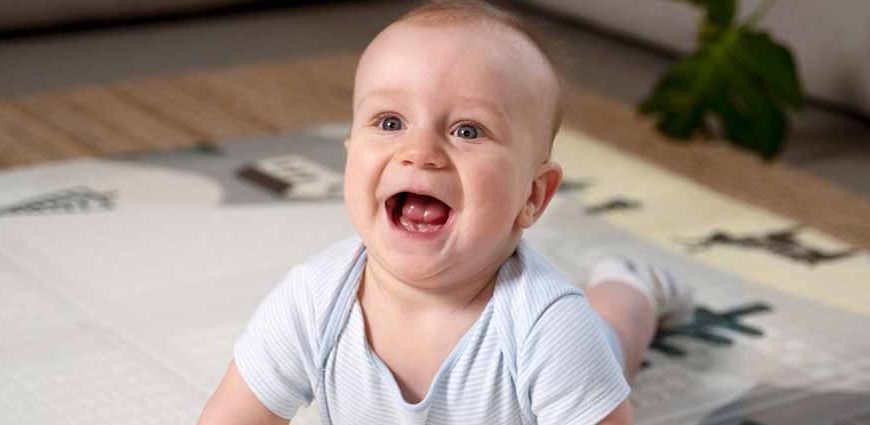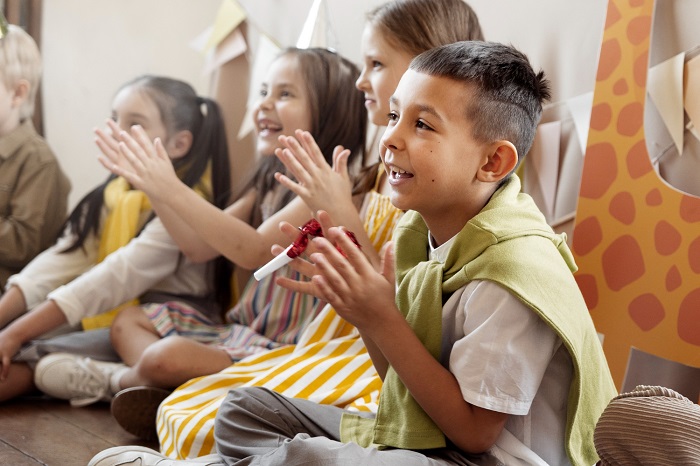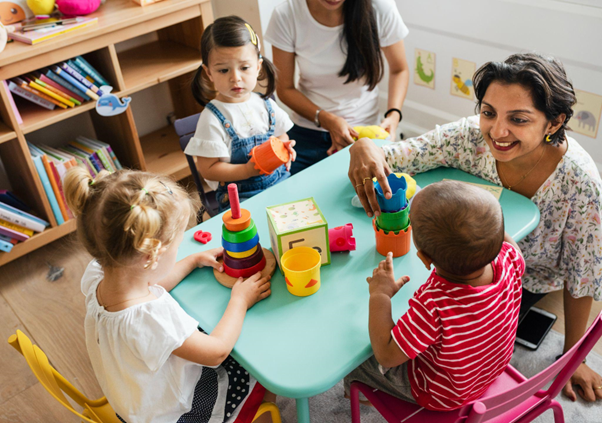A parenting moment you will remember forever, is when you first hear your baby laugh. There’s nothing that gives a parent a greater sense of satisfaction than seeing their baby happy. In this case, they’re indulging in laughter for the very first time – be it a chortle, chuckle or even a full-bellied laugh. Your baby’s laughter is certainly one of those Kodak moments you’ve been waiting for, and a step up from all that cooing and gurgling that has erstwhile been keeping them busy.
“Infants experience pleasure from processing information that’s a little bit new and a little bit similar.”
– Paul E. McGhee, PhD, a developmental psychologist
When do babies even start laughing? Let us explore this together. Your baby’s first laugh might hit you at the most unexpected time; probably even in the moments you’re not even trying to make them laugh. Generally, most babies laugh at the age of around 3 to 4 months.
It’s important to be cognizant of the fact that while your baby’s laughter is in itself a matter of sheer pleasure for them, your reactions to their laughter, too (the expressions on your face and the sounds you make) serves to delight them even further. As babies begin to use their mouth and tongue more and more, they will find themselves laughing for the sake of laughing! While that ‘age when babies laugh’ might come sooner or later than expected in your case, it marks the beginning of a life of laughter.
Do you know at what age babies laugh?
What Really Makes Babies Laugh?
For every parent, a baby’s first laugh can be a joyous one. There’s no limited set of reasons behind a baby’s laughter. It could be anything that sets their laughing off – their favourite person (Don’t worry, of course it’s you!), or even a pet. Your baby’s laughter at this tender age is nothing short of being a response to a stimulus. It is only later that they will get the joke, when they realise that something is out of whack.
Only a few months later, you might be pleased to discover them laughing at a funny sound you might be making. When they are around 6 months of age, they are pretty aware of the world around them. This is when they are prone to be pleasantly delighted when things in the world as they know it, are out of the ordinary. Baby’s first laugh is a thing of the past; now, they have actual reason to laugh!
How to Encourage Baby’s Laughter? 7 Easy steps to Try!
Ever tried your hand at being a stand-up comedian? Now might be just the time you did! Before you do, though, make sure that your audience is well-fed and rested.
While your child might not have a sense of humour, they do pick up on your comical cues. So, whether you’re waddling like a duck or just making funny faces, there’s a good chance of them reciprocating. There are a variety of techniques you can use to possibly induce a baby’s laugh. These include the following:-
- Making funny faces.
- Dancing with silly moves.
- Making funny sounds.
- Blowing raspberries on their bellies.
- Singing a song.
- Rubbing their noses with yours.
- Peekaboo.
Time to bring out The Joker in you!
Now you can truly ‘Dance like nobody’s watching’! You’re not going to be conscious of the baby watching ‘you’. Tip: The sillier the dance moves, the better.
You’ll be surprised at the plethora of silly sounds you can make; sounds that might get you laughing, too.
After the baby’s first laugh, they are sure to laugh every time you do this.
Singing classics like Itsy Bitsy Spider is a great way to possibly elicit laughter in your little ones. The bathroom is not the only place you can put your amazing vocals to the test.
Apart from being one of the most intimate things you can do with your child, this might just get them to laugh, too.
The classic ‘hiding your face in your hands’ and then shouting ‘Peekaboo!’, might just surprise your child to the point of undiluted laughter! These are some of the techniques to cause the baby to laugh. Moreover, when a baby starts laughing their infectious smiles fill the room with joy and memorable moments.
Making Babies Laugh Age-wise
There’s no hard and fast rule for making babies laugh, but here’s how you can try to get babies to laugh at different stages of their early years.
3-month-old baby: Bouncing on Knees
This is the time when physical arousal might just do the trick. Bounce them on your knee. You never know when they might just burst out into laughter.
6-month-old baby: Aping an Ape
Pretending you’re a monkey is a really good idea to get a baby laughing at this stage. This is when silly facial expressions will almost always get them to burst into peals of laughter.
9-month-old baby: Putting a tumbler on your head
This is the time when a baby is adept at observing things outside their ordinary realm of experience.
12-month-old baby: Seeing a cow moo
Take the baby to the farm or the local market and observe their reaction when they see a cow moo. They might just break into a laugh! This marks a time when they won’t be merely looking at you as a source of their laughter. Their world has expanded and so has their sense of humour.
Tickle – Tickle – Is it a Good Idea to Tickle My Baby?
While tickling your child might be one of the first things you think of doing to make them laugh, you might be sorely disappointed to see your efforts have absolutely no effect. According to child development expert Lawrence Kutner, PhD, co-director of the Harvard Medical School Center for Mental Health and Media, there’s a theory that newborns don’t get ticklish because they don’t yet believe that other people are separate from them. Ever tried tickling yourself? No matter how hard you try, you don’t feel ticklish!
That being said, after the first few months, every baby does get ticklish. According to Kutner, that’s because they are now getting that sense of being separate from others.
Every ‘first’ in your baby’s life marks an important milestone in their development, and a baby’s first laugh is no exception. We at EuroKids pride ourselves greatly on the sense of joie de vivre our classrooms are imbued with. Our goal is simple: nurture happy children who learn, laugh and love to the fullest.
Conclusion
A baby laughing can bring joy and warmth, brightening even the gloomy days for parents. In this article, we have provided details about babies’ laughter that suggest tips to understand at what age babies laugh. We hope to have answered the question, ‘When do babies start laughing?’
For informative and accurate articles on all things related to your new born-toddler’s development, growth, health and nutrition, follow EuroKids Blogs and do check out our nationally recognized preschools – EuroKids for the first step in your kid’s educational journey!
Which one of the techniques are you going to try to hear our baby’s sweet giggle?














